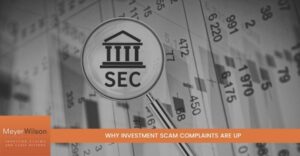
Why the SEC is Concerned About The Rise in Scams
The U.S. Securities and Exchange Commission (SEC) has reported more complaints and tips involving investment scams, and they urge investors to be on high alert to stay protected against fraudsters. The SEC’s theory is that scammers may be using the COVID-19 pandemic to prey on vulnerable or isolated individuals who may be fearing their financial future. Here’s what every investor needs to know.
We Have Recovered Over
$350 Million for Our Clients Nationwide.
How to Stay Protected Against Investment Scams
Beware of Ponzi Schemes
Ponzi schemes are designed to pay existing investors with funds contributed by new investors. The biggest red flag of a Ponzi scheme is the promise of high returns with little to no risk involved. Other warning signs include:
- Account statement errors
- Difficulty cashing out payments
- Secretive or confusing investment strategies
- Unlicensed sellers or unregistered brokerage firms
- Positive investment returns regardless of market conditions
Our lawyers are nationwide leaders in investment fraud cases.
Be Cautious About Opportunities to Invest in CDs
Certificates of Deposit (CDs) may be a sound investment for those investors who want to have a stable, fixed-rate return during market instability. While this may be a sound way to protect your money, it’s critical to understand that there are “spoof” sites mimicking legitimate financial institutions offering fake CDs. Here are some red flags to watch out for:
- High interest rates with no penalties for withdrawal.
- They are solely promoting CD products.
- Pressuring investors to wire funds to an overseas account that has a different name than the institution listed.
- Using “clearing partners” that aren’t registered with the SEC. Clearing partners are liaisons between investors and clearing corporations that handle the delivery of transactions.
We Are The firm other lawyers
call for support.
Be on The Lookout for Affinity Fraud
Affinity fraud is a practice where scammers pretend to be members of a specific group such as the elderly, religious, or ethnic communities. They may “recruit” a respected leader from the group to relay information about a scheme to convince other members that the “deal” is legitimate. Affinity scams commonly involve Ponzi or pyramid schemes.
If You’ve Been a Victim of Investment Misconduct, We Can Help.
When vulnerable individuals are lured into an investment scam, or their broker takes advantage of trust, the consequences can be devastating financial losses. When your future is at stake, and you don’t know where to turn, we are here to fight for you. Our team of attorneys at Meyer Wilson is here to help you hold financial institutions and brokers accountable for their negligent actions and recover your losses.
To learn if you are eligible for FINRA arbitration, call Meyer Wilson at (614) 532-4576 or contact us online to speak confidentially with our caring lawyers today.
Recovering Losses Caused by Investment Misconduct.


